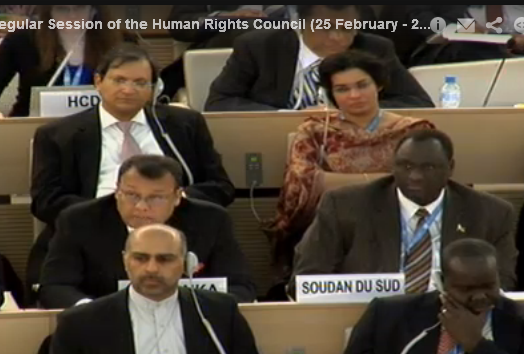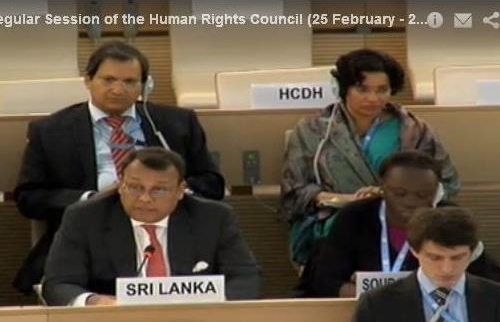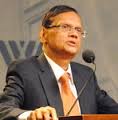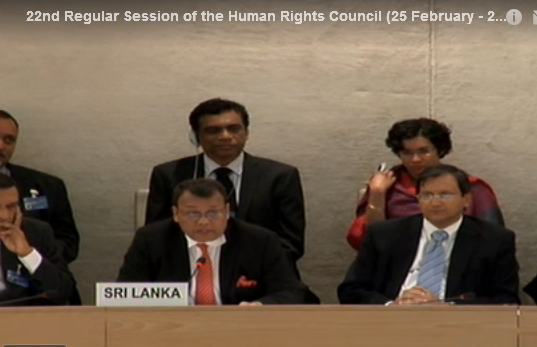The Resolution before the Council today is premised upon Resolution 19/2 of 2012 which was not recognized by Sri Lanka.

Despite our dissociation with that initiative, I must point out the salient features of that Resolution which called for Sri Lanka to implement the recommendations of its domestic mechanism, the Lessons Learnt and Reconciliation Commission (LLRC) and to formulate an action plan for implementation. Since its adoption, Sri Lanka has shown clear progress towards comprehensive reconciliation including by the preparation and implementation of the action plan called for by the Resolution.
Full text of the statement
With 13 countries opposing the resolution, 8 countries abstaining, and 1 country absenting itself, 22 out of a total of 47 members of the Human Rights Council, refused to support the U.S. sponsored resolution on Sri Lanka which was taken up for debate and vote at the 22nd Session of the UNHRC in Geneva on Thursday (21 March 2013). This cross regional group included Congo, Ecuador, Indonesia, Kuwait, Maldives, Mauritania, Pakistan, Philippines, Qatar, Thailand, UAE, Uganda, Venezuela (which opposed) and Angola, Botswana, Burkina Faso, Ethiopia, Japan, Kazakhstan, Kenya, and Malaysia (which abstained) and Gabon (which absented itself).
Developing countries expressed their confidence for the efforts made by Sri Lanka towards achieving national reconciliation and commended its level of cooperation with the UN.They clearly highlighted that the report A/HRC/22/38 was tabled today (20 March 2012) at the UN Human Rights Council under the agenda item 2 by the Office of the High Commissioner for Human Rights (OHCHR) was unwarranted and a clear overstepping of its mandate.They also underlined that the report of the OHCHR has no nexus to the principle objectives of the US sponsored resolution 19/2 of March 2012, and therefore, any further initiatives in the Council, based on or emanating from this report are counterproductive.
Full text of Media Release

We wish to express our strongest reservations as to the content of the report on Sri Lanka as well as the procedure followed in formulating this document which bears numberA/HRC/22/38. This report purports to be pursuant to Resolution L. 19/2 which we have rejected. We also question how a technical mission, after a visit of just over a week, could have produced such a document purporting to be a comprehensive report pursuant to L.19/2.

In letters addressed to Foreign Ministers of Human Rights Council (HRC) member countries, External Affairs Minister G.L.Peiris has said, “the Government of Sri Lanka believes that drawing disproportionate attention to Sri Lanka’s situation and introducing a resolution that seek to discredit, single out the country and name and shame are unhelpful and counter productive to Sri Lanka’s current reconciliation process. The beneficiaries of such action would be none other than the divisive forces that seek to destabilize the hard won peace in the country. Moreover, the precedent created by intrusive, biased and politicized actions such as the US sponsored resolution on Sri Lanka would pose a danger for all nations”.
Sri Lanka today stated that it remains constant in its support for the State of Palestine and its people for their struggle to achieve the right to statehood, within the framework of a sovereign, independent, viable and united state of Palestine, co-existing peacefully alongside Israel. The Statement was delivered by Deputy Permanent Representative of Sri Lanka to the UN, Ms. Manisha Gunasekera.
Sri Lanka made this statement under the agenda item 07 of the General Debate, on 18 March 2013.
Full text of the Statement

The 47 member states of the United Nation Human Rights Council unanimously adopted the report presented by the UPR Working Group today, (15 March 2013).
Hon. Mahinda Samarasinghe, Minister of Plantation Industries and Special Envoy of H.E. the President of Sri Lanka on Human Rights, and the leader of the Sri Lanka Delegation while making a statement assured the Council that “Sri Lanka will continue its transparent, proactive and constructive engagement with the Human Rights Council and keep Member and Observer States informed of further developments in Sri Lanka in the field of promotion and protection of human rights”.
